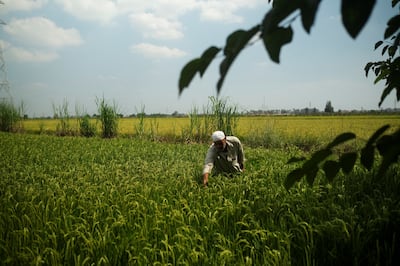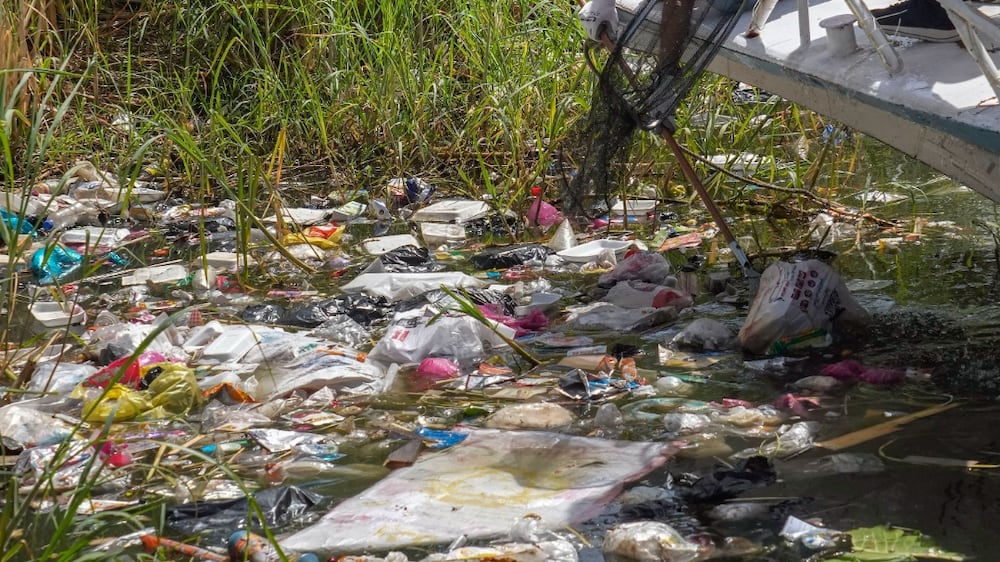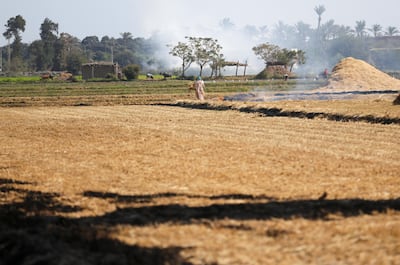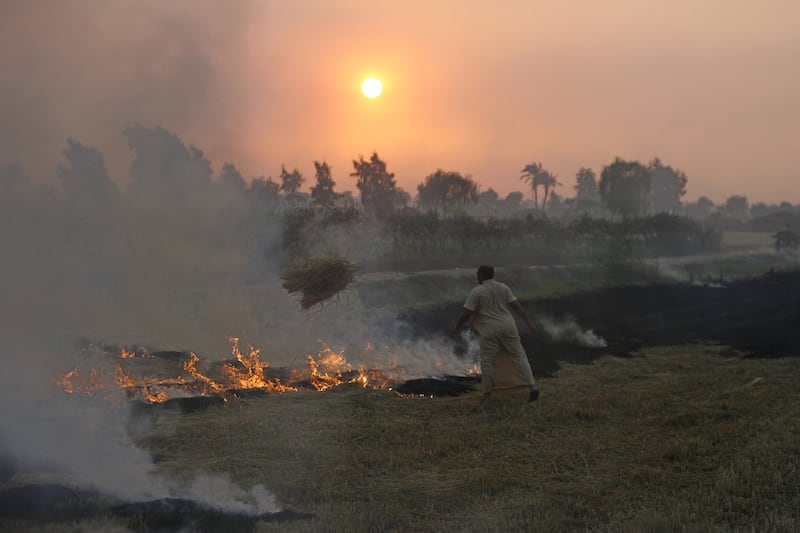Growing up in the Nile Delta, 38-year-old Noha recalls the annual rice harvest as a time of total misery.
To quickly clear their fields before planting winter crops, Egyptian farmers set fire to huge quantities of rice straw, the dry stalks left over after the harvest. For months, thick plumes of black smoke spread over the countryside, even lingering in the skies over Cairo.
The seasonal soot is referred to as the “black cloud”.
Burning rice straw poisons the air, filling it with greenhouse gases carbon dioxide and carbon monoxide. Studies found Egypt’s farmers were releasing the equivalent of 11 tonnes of carbon dioxide per hectare of rice straw burning. That’s approximately the amount of carbon dioxide released by 29 commercial jets flying from Amsterdam to Rome.
Prolonged exposure to heavy air pollution is linked to heart disease, stroke, lung cancer and respiratory diseases. United Nations data shows that air pollution in Egypt caused 90,599 premature deaths in 2019 and was 13.6 times above World Health Organisation guidelines.
For Noha, the noxious fumes would set off painful allergies and sinus inflammation. The air was so bad that her family would take refuge in another home for two months, an option most Egyptians do not have.
“It was as if the house was on fire. The windows and curtains were blackened, and the walls, inside and out, would become full of black dust. The paint itself would change colour,” Noha said.
Recycle, don't burn

Although rice burning is still part of life in the Nile Delta, dramatic scenes like this are becoming less common after a recent push to eliminate the harmful practice.
Egypt has tried to position itself as a leader in tackling climate change since the announcement that it was to host the Cop27 climate conference in November 2022; the first Arab country to do so.
Over the past two years, Cairo has stepped up measures to encourage farmers to recycle the rice straw, billing it as a way to help farmers turn straw into animal feed and organic fertiliser instead of a harmful pollutant.
It has promised tractors, presses and hay balers to help farmers collect, compact and convert rice straw into fodder and fertiliser. The state also opened sites across the Nile Delta to collect and recycle the straw itself.
Dampening the flames
Last October, Egypt’s Minister of Environment Yasmine Fouad said the results were promising: nearly 1.3 million tonnes of rice straw had been collected, or 86.4 per cent of the total area under rice cultivation.
Independent data on rice straw burning s not available, but eight Nile Delta residents from three rice growing governorates, including five farmers, spoke to The National about the progress made.
Delta residents all agreed that the skies after last autumn’s rice harvest were clearer than usual. But they also said that rice straw burning is still regularly visible.
Egyptians clean up Nile before Cop27 climate talks

Amira, 29, from Gharbiya Governorate, said farmlands around her village were ablaze several times this year while she was returning from work at night. On a few occasions she could even smell the noxious fumes when in her home. Other residents reported the same: that field burning, although not as intense as in the past, has continued at night, when government monitoring is less effective.
For farmers, one of the major issues is sourcing the equipment necessary to recycle rice straw.
All five farmers said the government was not renting out equipment in their area, so they had to rent it from neighbouring farmers. In some cases, that meant delays that stretched on for several days, a major issue for farmers wanting to clear their fields quickly and plant the next crop.
Another issue is cost. At 250 Egyptian pounds per hour (about $8), the farmers had to pay about 1,000-1,250 pounds to rent a baler long enough to compress only one acre of straw, a large sum for farmers on tight budgets.
Still, some farmers said recycling straw can make economic sense, under the right conditions.
Abdel Latif, 44, a farmer from Daqahliyah Governorate, rented a hay baler from his neighbour and turned his half-hectare of rice straw into seven months worth of fodder for his livestock.
For Abdel Latif, not his real name, it was a relatively good deal. That is partly because the price of traditional animal feed has soared over the past year, the result of an economic crisis that has halved the value of the Egyptian pound.
But not all farmers have animals to feed, and when asked about the state recycling sites they said they had never heard of them.
Yahya, from Sharqiyah, was among the farmers who decided that it still made sense to burn off his rice straw after the harvest.
“I planted two acres of rice, so of course I had a lot of rice straw. I pressed one acre into bales and stored it for livestock. Then I burnt the second acre to cleanse the land,” he said.
Paper or fertiliser?

To truly eliminate the problem, recycled rice straw should be integrated into major industries, like paper manufacturing, said Ahmed Shawky Al Attar, editor-in-chief of Ozone, a platform for climate change issues in the Middle East. The straw could replace some of the huge quantities of paper that Egypt imports from abroad.
Or Egypt could take a cue from India, the world’s largest rice producer. India developed a system to spray enzymes into the soil after the rice harvest, turning the rice husks into useful fertiliser. It reportedly prevented more than a million tonnes of carbon dioxide emissions during a pilot programme in 2021.
In the meantime, the farmers say it’s not just the benefits of recycling straw that is providing a push, but the penalties imposed for burning it.
They said it has become more common for rice-burning farmers to be hit with hefty fines. A 2009 law stipulates that burning agricultural waste carries a fine of up to 100,000 Egyptian pounds, or up to one year in prison.
“When I burn rice and have to pay one of these 10,000-15,000 pound fines we are hearing about, who is going to help me?” Abdel Latif said.
This story was published in collaboration with Egab.






